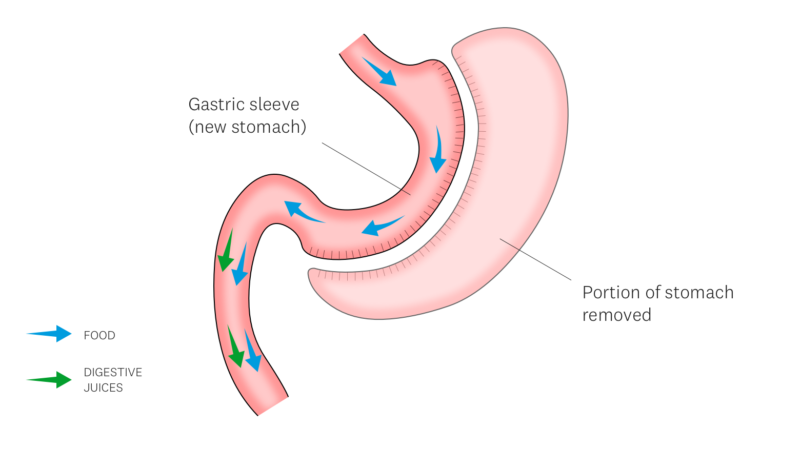Gastric Sleeve
The gastric sleeve has evolved over the last 20 years and is now the workhorse of bariatric surgery.
It is the most commonly performed weight loss surgery around the world. If you’re thinking about weight loss surgery, the gastric sleeve is a good starting point.
Gastric sleeve surgery involves removing 80-90% of your stomach, resulting in a new stomach volume of approximately half a cup (100-150ml). This is performed laparoscopically (key hole approach) through several small incisions in the abdomen.

A smaller stomach means that you can only eat a small amount of food and it is therefore considered a “restrictive” operation.
The portion of stomach removed produces Ghrelin (a hormone that makes you feel hungry). This leads to a drop of these levels in your body and a loss in your appetite.
As a consequence of a reduction in ghrelin levels and a smaller stomach, you don’t feel hungry, and when you do eat, you can only eat small volumes. This ultimately leads to weight loss. On average, you will lose between 60-70% of your excess weight.
Benefits of gastric sleeve surgery
- Significant and sustained weight loss – on average, people can lose up to 70% of their excess weight
- No “replumbing” of your small bowel
- Improvement or remission in weight related health conditions such as diabetes, sleep apnoea, hypertension, hyperlipidaemia, joint and back pain
- A reduction in cancer risk – obesity is linked to many cancers including endometrial, breast, ovarian, oesophageal, stomach, pancreatic, liver, kidney, and thyroid
- A reduction in vascular events such as a heart attack or stroke
- Living to a normal life expectancy
- Improvement in quality of life such as mobility, energy levels, relationships, and employment opportunities
Sometimes, significant weight loss is a requirement for other surgical procedures such as a hip or knee joint replacement.
Every person is unique and as a consequence, outcomes will vary between individuals.
Complications of gastric sleeve surgery
- Staple-line leak – this may occur within the first two weeks after surgery. The stomach contents can leak into the abdomen due to failure of the staple line to heal. Further surgery/procedures may be necessary as well as a prolonged hospital stay.
- stricture/Stenosis – a narrowing may occur half way down the sleeve. This can occur several months after the operation. This may require stretching up with a balloon, or placement of a stent (tube) within the sleeve, and removal 4 weeks later. Occasionally, revisional surgery may be required.
- Acid reflux – you may get symptoms of heartburn. Most times, this can be treated with medications. Revisional surgery is sometimes necessary.
- Nutritional deficiencies – even though you will need to take multivitamin supplements, you can become low in certain vitamins or minerals. Additional supplementation may be necessary. You will require lifelong follow-up and blood tests to monitor for potential deficiencies.
- Port site pain – particularly on the right side of the abdomen (associated with removal of stomach). This may last for several weeks after surgery.
- This is not an exhaustive list of all complications
Want to start your gastric sleeve journey?